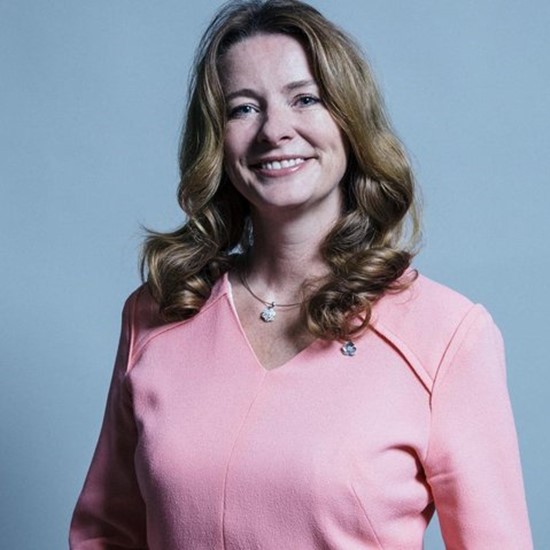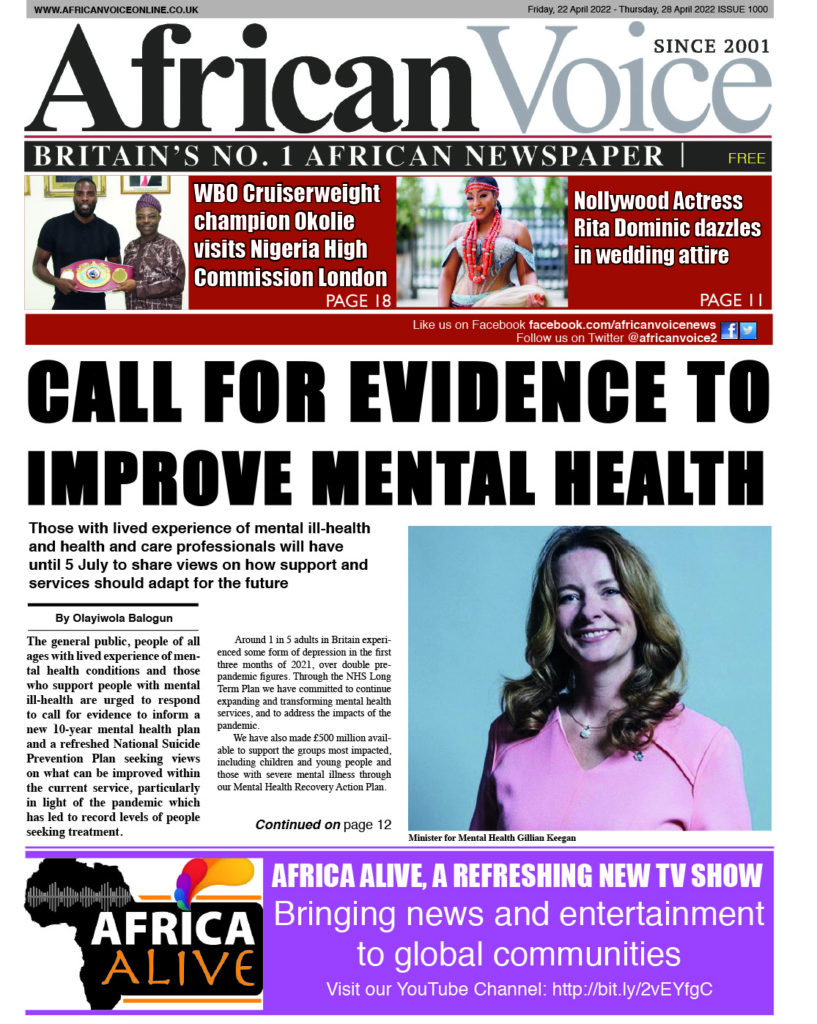
Those with lived experience of mental ill-health and health and care professionals will have until 5 July to share views on how support and services should adapt for the future
The general public, people of all ages with lived experience of mental health conditions and those who support people with mental ill-health are urged to respond to call for evidence to inform a new 10-year mental health plan and a refreshed National Suicide Prevention Plan seeking views on what can be improved within the current service, particularly in light of the pandemic which has led to record levels of people seeking treatment.
Around 1 in 5 adults in Britain experienced some form of depression in the first three months of 2021, over double pre-pandemic figures. Through the NHS Long Term Plan we have committed to continue expanding and transforming mental health services, and to address the impacts of the pandemic.
We have also made £500 million available to support the groups most impacted, including children and young people and those with severe mental illness through our Mental Health Recovery Action Plan.
The call for evidence will now build on this progress, adding to our understanding of the causes of mental ill-health, listening to people who have interacted with services and those who know and support them, to draw on ‘what works’. This will support the development of a plan which aims to prevent and mitigate the impacts of risk factors on mental health and suicide, particularly for groups who experience disparities.
The 10-year plan builds on the NHS Long Term plan and forms part of the government’s wider commitments to Build Back Fairer, working towards putting mental health on a level footing with physical health, and forms a key part of the commitments to address health disparities across the country and to improve the mental wellbeing of the nation by 2030.
Health and Social Care Secretary Sajid Javid said: “The pandemic put unprecedented pressure on people across the country. While we continue to expand and transform our mental health services under the NHS Long Term Plan to meet rising demand, we know we need to go further.
“Too many people, particularly our children and young people, do not have the tools and support they need to look after their wellbeing or prevent mental health problems from escalating.
“We all have a role to play in resetting the way we approach mental health and our new 10-year plan will set an ambitious agenda for where we want the mental health of the nation to be a decade from now.”
The sooner someone receives support when they are struggling with their mental health, the more likely it is they will recover. The call for evidence seeks views on how the 10-year plan can complement and extend the work of the NHS Long Term Plan to better address how local services can work together, to prevent those at risk from falling into mental ill-health through earlier, targeted help.
The NHS plays an important role in identifying, diagnosing, treating, and supporting people with mental health conditions, and there are also a range of public, private and community services ideally placed to identify people who may be struggling that can offer support or signpost to NHS services. This may include education settings, housing associations, social care, youth centres, workplaces and job centres.
Minister for Mental Health Gillian Keegan said: “Across the country, no matter your background, you should have the opportunity to grow up in, and stay in, good mental health.
“I want anyone who needs mental health services to be able to access them.
“I encourage everyone, especially those who live with a mental health condition, carers and our brilliant workforce, to share their views on how we improve mental health services and reduce disparities across the country.”
The call for evidence, which opens on (Tuesday 12 April) and will close on 5 July seeks to build consensus on the priority actions we need to collectively take to reduce the number of people who go on to develop mental health conditions, especially for children and young people and communities at greatest risk. It’s important responses are reflective of society, include those from people of all ages and backgrounds, to ensure future services work for all.
It is actively seeking views on several key questions which will be addressed in the plan including:
How can we all promote positive mental wellbeing?
How can we all prevent the onset of mental ill-health?
How can we intervene earlier when people need support with their mental health?
How can we improve the quality and effectiveness of treatment for mental health conditions?
How can we all support people living with mental health conditions to live well?
How can we improve support for people in crisis?
NHS England’s National Mental Health Director Claire Murdoch said: “The pandemic has naturally taken a toll on the nation’s mental health, so there is no better time for everyone to have their say on how we as a society can improve people’s mental wellbeing over the next decade.
“Improving people’s mental wellbeing requires action from all parts of our society, so it is vital that as many people as possible from all walks of life respond to this call for evidence.”
The plan will also look at how initiatives across government including green social prescribing, online harms and Thriving at Work can work together to ensure people’s daily practical, social and emotional needs are being met, as well as how to fully harness the potential of technology and data to support better mental health, and incentivise the private sector to play its part.
Responses from the call for evidence will also inform the development of a separate National Suicide Prevention Plan which will refresh the 2012 plan. Future detail on this plan will be set out in due course.
Dr Alex George, Youth Mental Health Ambassador, said: “We have made great progress in reducing the stigma associated with mental ill-health, but there is still work to do.
“Too many people still don’t know where to turn to for support or can’t access help early enough.
“Let’s continue to tackle the stigma that surrounds mental health – let’s respond to this call for evidence and all start a national conversation so that in 10 years from now, the mental health of the nation will be better supported. I am keen to see the outcomes of this consultation followed by adequate funding.”
Paul Farmer, Chief Executive of Mind, said:“Mind has long been calling for a more joined-up approach from Government to mental health, one which follows the evidence of what works in areas like benefits, education, and housing to build a better future for us all, and reduces the glaring racial and social inequalities that persist in mental health.
“A truly cross-Government plan will play a key role in making sure support for our mental health starts to be rebuilt post-pandemic to the same level as for our physical health.”
Advisor to the Government on the National Suicide Prevention Strategy, Louis Appleby said: “A new plan for suicide prevention is a chance to reflect the changing pattern of risk, on issues such as online safety and gambling.
“It’s a chance to renew our vigilance and reinvigorate the efforts of the people we depend on – bereaved families, charities, professionals and many more. It’s a chance to ensure that suicide prevention is built into our recovery from Covid & to set the priorities for action for the next few years.”
Victoria Hornby, CEO of Mental Health Innovations, which powers Shout 85258: “We welcome the Call for Evidence to inform a new 10 year Mental Health Plan and look forward to contributing insights and evidence from the first four years of the operation of the Shout service. Over the course of the pandemic, our Shout text service saw conversation numbers with people in distress increase three-fold.
“This substantial growth has enabled us to gain unique insights into the mental health needs and experiences of key groups, including children and young people, those who identify as LGBTQ+, people with autism, and underserved communities.”
Marjorie Wallace CBE, Chief Executive of SANE, said: “This is a once-in-a-lifetime chance to help create mental health services able to respond to individual need at the time a person reaches out for help, or when they need consistent support. We hope that everyone concerned will take this opportunity to shape the future.”
Mark Rowland, Chief Executive of the Mental Health Foundation, said: “We welcome the government’s recognition that our mental health doesn’t exist in a silo. It’s influenced by the quality of our relationships, education and housing, the fairness of our justice system, the security of our income and the health of our communities. A well-resourced whole-government plan for mental health is the pioneering step we need for building the mentally healthy society we all want: where mental health is an asset to be nurtured, rather than a problem to be treated.”
Mubeen Bhutta, Head of Policy, Public Affairs & Campaigns at Samaritans: “Suicide is preventable and the refreshed suicide prevention strategy and next 10-year mental health plan are real opportunities to save lives and make sure we learn lessons from previous approaches.
“It’s crucial this consultation hears from people with lived experience. The long-term impact of the global Covid-19 pandemic is likely to play out over many years and so it is vital that we have a well-planned strategy to ensure that mental health and suicide prevention are considered just as important as physical health to the wellbeing of the nation.”
The questions in the call for evidence have been developed in partnership with stakeholders and people with lived experience of mental ill-health. More detail on each of the questions can be found in a discussion paper also published today (12 April) alongside the Call for Evidence.
We are transforming mental health services in England with an extra £2.3 billion a year. This includes expanding talking therapies to ensure 1.9 million people will be able to access them by 2023/24, and give an additional 345,000 children access to NHS-funded services or school and college-based support by 2024.
Kindly follow us on twitter:@AfricanVoice2











